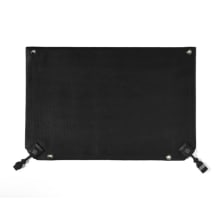5 reasons snow-melting mats are a smart buy for seniors
These mats do more than melt snow
 Credit:
Reviewed / Heat Trak / Riakrum
Credit:
Reviewed / Heat Trak / Riakrum
Products are chosen independently by our editors. Purchases made through our links may earn us a commission.
Winter can be a dangerous season for anyone, but for those with accessibility issues, a slip or fall could mean the loss of independent living.
Snow-melting mats can make accessible living easier in wintery weather, however—and for some unexpectedly beneficial reasons, too. While most mats can melt up to 2 inches of snow per hour (the equivalent of a major storm or low-grade blizzard), there are also significant cost and convenience wins when it comes to investing in snow-melting mats.
1. Melting mats reduce the factors that lead to slips and falls

The extra rubber traction on this Rikarum snow-melting mat can prevent falls from happening.
Back strain from shoveling can put seniors out of commission and on the couch for days or weeks at a time. But falls are one of the leading causes of hip fractures for seniors that can also lead to loss of independence and a long recovery. Addressing factors that may lead to slippery conditions—like melting snow and ice before it forms—can help reduce the likelihood of a fall.
Riakrum Heated Snow Melting Mats come in multiple dimensions and feature a non-slip surface to increase traction for every foot. Traction is especially important for those who use wheelchairs or mobility aids, too.

These mats remove ice buildup that can lead to slips and falls.
2. They can be used all over your house

You can get the most out of your purchase when interchanging these mats between indoor and outdoor surfaces.
Heated mats melt snow and prevent ice from forming in some of the areas of the home—like the thresholds from inside to outside—that can pose danger. But many snow melting mats, like those from KNVSS, have multiple uses. These include preventing precipitation from building up on roof valleys (the spots where two roof surfaces meet) that can lead to leaks or expensive roof repairs.
What’s important to remember, however, is that the runoff flows downwards, which means it’s just as much a priority to prevent icing on the roof as the ground.

These snow-melting mats can keep ice from building up on your roof.
3. Snow-melting mats make financial sense

Up to 5 centimeters of ice can be melted after just one hour of use with the Jingt Snow-Melting Walkway Mat.
Given the rising cost of living, the kid next door is unlikely to provide snow removal for $5 per hour, and contracting with a snow plow operator can cost hundreds of dollars per snowfall.
Some of the less expensive models, like this mat bundle from Jingt, can be used again and again, year after year, meaning users spend less over the course of time.

This mat set is an investment up front that can save you money (and injury) in the long run.
4. The installation process is user friendly

Severe weather that produces freezing temperatures won't stop the SnowMeltz Heated Driveway System from doing its job.
In the tech world, “plug and play” refers to software or devices that work well without modifications when first connected. Heated snow-melting mats and snow-melting systems work pretty much the same way. Slachcool Heated Walkway Mats are basically heavy-duty rugs that are wired to be plugged into an outdoor outlet and left outside all winter. There's no need to roll and unroll every time it rains or snows.
Some models, like this SnowMeltz Heated Driveway System, are even designed to operate automatically. The controller turns the system on to heat the surface just above freezing since moisture, temperature, and precipitation are constantly monitored.

Getting to and from the car on an ice-covered driveway can be treacherous. This system keeps ice from building up in the first place.
5. Snow-melting mats are generally energy efficient

HeatTrak offers snow-melting mats in a variety of sizes for your home.
With a snow-melting mat, you can save yourself the head-scratching time at the home supply store trying to figure out which chemical ice melt is safe for plants, grass, and wildlife.
Most models also use little energy, too. HeatTrak estimates its mats—which come in multiple configurations, sizes, and costs for residential and commercial use—will be $0.15 an hour to operate for a homeowner. That means it would cost less than $1 to power for a storm that rages for four to six hours.

Snow-melting mats use surprisingly little energy.


